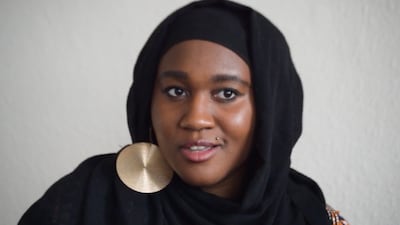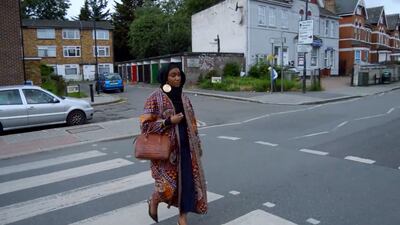The rise in anti-Muslim sentiment in Britain is a painful reminder for Bafta-winning filmmaker Samir Mehanovic of the intolerance that led to years of armed conflict in his homeland of Bosnia in the 1990s.
Mehanovic, 54, said the UK's politicians were fuelling the fire with divide-and-rule tactics similar to those used by officials in the Bosnian war.
“Britain is dealing with the ghosts of its past,” he told The National. “It is like a bird putting its head in the sand and ignoring third or fourth-generation British people, who have struggled with identity because they are British but face Islamophobia every day.
“The country is very much split at the moment. Are we going to have a Britain that’s very right-wing? Or are we going to have some balance?”
The feelings of alienation and relentless discrimination that Muslims, and particularly Muslim women, feel in Britain are the focus of Mehanovic’s most recent documentary, HIJABI, which is set for release this year.
“Of all the hate crime against Muslims in Britain, it's rising mostly against women, because they're visibly Muslims,” he said referring to the Islamic headscarf from which the film takes its name.
filmmaker
Shot during the Covid-19 pandemic, it brings together interviews with five British Muslim women whose activism has brought them into the public eye.
Among those featured are Asma Shuweikh, who appeared in a viral video defending a Jewish father and son from anti-Semitic slurs on the London Underground in 2019, and Amna Abdullatif, who spoke out against racism in football after the Euro 2020 finals when three black England players missed penalties in the team’s defeat.
It comes as Tell Mama, which describes itself as the leading agency in monitoring anti-Muslim hate crime documented a 235 per cent increase in Islamophobic incidents in the four months following the October 7 attacks by Hamas, in which about 1,200 people, mostly civilians, were killed and about 240 taken hostage.

Israel responded with a relentless air and ground campaign in Gaza, which the enclave’s Health Ministry says has killed more than 31,900 people, mostly women and children, and injured more than 73,700.
After a rough-cut screening of HIJABI in the House of Commons last week, Labour MP Shabana Mahmood, shadow secretary of state for justice, warned of an “explosion” in anti-Muslim hate crime above and beyond what was being reported.
What most concerns Mehanovic is the rising temperature of political rhetoric, such as recent comments by Lee Anderson, a Conservative MP at the time, that London Mayor Sadiq Khan had handed control of the capital to his Islamist “mates”.
Last week, rights groups criticised the government’s new definition of extremism as “cynical”, “unworkable” and “profoundly anti-democratic”.
Before the announcement, UK Communities Secretary Michael Gove said the change in definition was a specific response “to the increase in the amount of anti-Semitism and anti-Muslim hatred that we’ve seen on our streets”.
Mr Gove also suggested that extremist groups were behind the protests for Palestine that have been taking place in London since the start of Israel's war in Gaza.
However, the Archbishops of Canterbury and York responded in a joint statement that the new definition of extremism “risks disproportionately targeting Muslim communities, who are already experiencing rising levels of hate and abuse”.
“That’s how it started in Bosnia,” Mehanovic said. “They were calling us names. The politicians have been threatening and encouraging the destruction of Muslims. Even lately, [Bosnian Serb leader Milorad] Dodik said that there is again an infestation of Muslims.”
As a boy in what was Yugoslavia, where cities such as Sarajevo were famed for their cosmopolitan nature and religious pluralism, Mehanovic never had cause to believe a sectarian war would unfold.
“I grew up in a very multicultural and liberal socialist country. We celebrated not one but six major holidays: two Easters, two Christmases and two Eids,” he said, recalling the synagogues, churches and mosques in the city, where Christians of different Eastern Orthodox and Roman Catholic traditions also coexisted.
“That’s how and why and it was shocking that we had such a terrible war which resulted in genocide against Bosnian Muslims."
Mehanovic went on to talk about the struggles he faced in securing funding for HIJABI from commissioners and arts bodies despite the success of his previous films. “It looks like I’ve been sidelined for no reason other than the subject,” he said.
In the documentary’s “close-up” conversations, viewers watch as the women’s initially strong outward appearances break down.

One subject reveals how her grandmother was beaten in the street by their neighbours in a northern town. Another recalls the rise of the British National Party in her hometown and how it influenced her school friends.
“I consciously chose active and powerful women but there was that hidden pain,” he said.
Mehanovic also received online abuse after his movie was screened at the House of Commons, footage from which he hopes to include in the final version of the film.
Rising Islamophobia was also linked to the war in Gaza, where he fears another genocide due to indifference and inaction from the West and other global powers.
“Gaza reminds me inevitably of Bosnia when the world was watching and really doing nothing. I never knew why, why did the Bosnian genocide happen?” he said.
“The first stage of genocide is dehumanisation. In Bosnia, we were begging the world for this to stop – there’s a 30-year parallel with Gaza. The genocide happening in Gaza is going to be 100 times bigger than Bosnia’s, and that hurts me.”

A month after the massacre at Srebrenica in 1995, in which more than 8,000 Muslim men and boys were killed by Serbian forces over three days, Mehanovic decided to leave his birthplace. He now lives in Edinburgh.
“I realised that even being a white, European, secular Muslim wasn't good enough,” he said. “We Bosnians were punished for that. Now, again, Palestinians, because they are Muslims, are being punished. Since then, I've struggled with my identity of being Muslim and being western European.”
His abiding hope is that HIJABI and the experiences recounted by the women in it will be remembered and play an important role in contributing to a growth in tolerance in the long term.
“In 30 years’ time, I want people to watch the film, and say, ‘Look how bad humanity was then and how good we are today,'" he adds.


